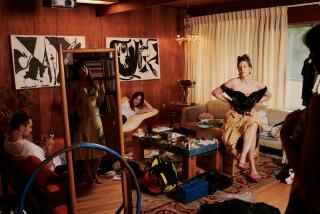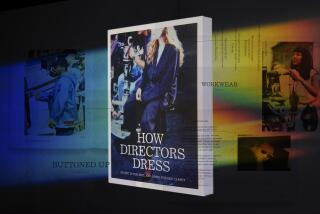‘Mad Men’ sets inspire designers
By David A. Keeps, Times Staff Writer
The AMC drama “Mad Men,” which paints a gin-soaked, cigarette-stained, ulcer-inducing picture of Manhattan’s advertising industry circa 1960, is a period-perfect re-creation of the past, colored by the emerging trends of the present: When those hard-driving executives leave their masculine Modern office suites, they go home to the feminine Colonial Revival homes of suburbia.
Call it an antidote to the midcentury minimalism that has become so prevalent in Los Angeles home design today.
“Do I think homes will be filled with frills and knotty-pine paneling?” asks New York City designer Jeffrey Harris, who’s hooked on the show. “No, but I do think that we will be seeing reinterpreted elements of that look.”
We already are. Take the headboard in the bourgeois boudoir of main characters Don and Betty Draper, whose names, series creator Matthew Weiner says, are a tip of the pillbox hat to Dorothy Draper, the most influential Manhattan decorator of that era. Swathed in button-tufted velvet in a frosty shade between blue and green so in vogue now, the headboard is an amped-up, Doris Day version of models found at showrooms such as Mitchell Gold + Bob Williams and Restoration Hardware.
“Mad Men” set decorator Amy Wells swapped out the mahogany headboard that was part of a vintage bedroom suite used in the show in favor of a replacement whose elaborate curves and tufting made it “very sexual-looking,” she says.
“The headboard scared me,” admits Weiner, whose show closes its first season tonight. But he soon realized that the bedroom was important to Betty’s character and needed a “special flavor,” of which sexuality was an important component.
Wells says she practiced “presentism -- the act of interpreting the past through the present.” She was an admirer of the Hollywood Regency headboards in Kelly Wearstler-designed hotels and had been shopping for a tufted headboard of her own at Cisco Bros. and Williams-Sonoma Home.
An even more over-the-top version of the headboard pops up in a female secret agent’s apartment in the NBC comedy “Chuck.” It all reflects what Diamond Foam & Fabric owner Jason Asch says is a growing interest in upholstered beds.
“Button tufting is really an art,” he says. “It’s like pleating or smocking on a James Galanos dress -- a sign of craftsmanship and luxury.”
The result is a classic, finished look that more people are turning to as the starting point when designing a bedroom, says Dave DeMattei, president of Williams-Sonoma Home. Two years ago, the firm began offering tufted headboards inspired by the 2003 Diane Keaton film “Something’s Gotta Give.”
Now, custom-upholstered headboards account for the majority of the company’s bed business.
“The fact that the headboard in ‘Mad Men’ and the ones that inspired Williams-Sonoma Home both look so current speaks to the timelessness of this look,” DeMattei says.
--
FOR the distinctly different vibe of the Madison Avenue offices in the series, Wells found inspiration from still-popular Danish modern furniture and the corporate American designs of Florence Knoll.
“I got the whole suite of furniture in Don Draper’s office from Futurama and Denmark 50 in Los Angeles,” she says. “Futurama made me a beautiful coffee table with a magazine ledge, and their reproduction couches are the only ones that are comfortable on the set.”
The Manhattan furniture is as sleek and tailored as the pegged skirts and bullet-bras worn by the secretarial pool, but the pinch-pleat curtains that Wells bought at JC Penney and the skirted davenport in the Draper home are meant to be as ladylike as June Cleaver’s crinolines. Wells describes the Drapers’ home in Ossining, N.Y. -- decorated as a counterpoint to the modernist Manhattan office furnishings -- as a “page out of a 1955 House & Garden.”
Some viewers might be surprised that the Drapers “don’t live in Eames-ville and wear Pucci clothes,” Wells says. “But we are portraying a very realistic view of a time when we were not such a throwaway society, and buying furniture was a lifetime investment.”
Series creator Weiner thinks that what was going on in American homes then is the same now: a mix of antiques, tradition and comfort. He strove to make sure that furnishings were not all contemporary, “that every previous era was represented -- the way it is in real life. I believe that Betty Draper, having an upstate New York home, would want to fill it with traditional furniture and family heirlooms.”
The attention to detail impressed Jon Hamm, the actor who plays dashing but dark Don Draper.
“There was a towel holder in the bathroom with a clip shaped like a lady’s gloved hand on a faux marble stand,” he says. “My grandmother had one of those.”
Production designer Dan Bishop based the Draper house on a 1916 Colonial Revival he found in Pasadena.
“It’s a fairly prevalent style in older suburbs,” Bishop says. “There’s a huge chunk of this country that is still tapped into Americana and Anglophilia, folks wanting to identify with their historic past. It’s certainly never going to go away for people who are raising kids and like to bake.”
Bishop is responsible for creating that vibe in the Draper kitchen, Weiner says. “We talked about knotty pine because we all remembered it.”
Mixed with plaid wallpaper?
“When I saw it, I thought it had the perfect match of tradition, taste and a little bit of flair that gave the room at times joy and at times a somberness,” says Weiner, whose show has been renewed for a second season.
Designer Harris, a fan of wood paneling and Formica in unexpected places, says he is updating Colonial Revival furniture for contemporary interiors by giving them a fresh coat of paint or an outrageous upholstery fabric. The designer also has been working on a collection called Colonial Mod, which reinterprets Americana through the use of modern materials. Next year it will include deconstructed Colonial chairs and tables encased in acrylic boxes.
Is he a mad man? Hardly.
“It seems fresh and hip again,” Harris says. “It adds history and nostalgia to a room and, at least to us city types, even a subversive touch.”
--


